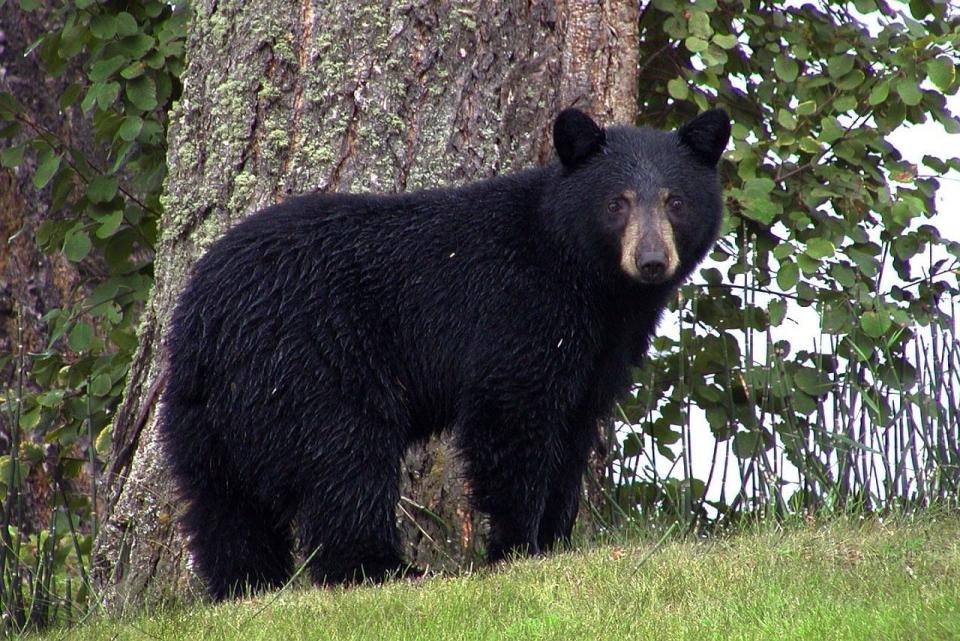DNR: Black bear population slowly creeping into West Michigan
GRAND RAPIDS — Hundreds of years ago, bears were a common sight in West Michigan. In the coming years, they could be once more.
The Michigan Department of Natural Resources says the black bear population across the state has risen sharply over the last decade, particularly in the Lower Peninsula. Cody Norton, a bear specialist with the DNR’s Wildlife Division, says that growth is forcing bears to expand their range and find new homes.

“Right now, our estimate is that (the black bear population in the Lower Peninsula) has increased almost 70 percent since 2012,” Newton told WOOD TV-8. “Not only has the abundance increased, but the distribution has increased, as well. We’ve got bears expanding into areas where there have not been bears in the recent past.”
Part of that population growth was by design. The balance between the low bear population and other Michigan species was misaligned, so the agency restricted the amount of hunting licenses for bears starting in 2012.
As of 2021, the DNR estimates there are approximately 10,650 black bears in the Upper Peninsula and 2,200 in the Lower Peninsula. Approximately 1,900 bears were allowed to be harvested in 2022 statewide.
The other part is the nature of the black bear. The DNR says female black bears typically have a home range of around 50 square miles and often overlap. Male bears rarely overlap territory and take up much more space, sometimes up to 335 square miles.
The DNR believes the population growth in the Lower Peninsula has started to slow, but wants to see a few more years’ worth of data for confirmation.
“The northern lower is a big region, too. So, we could be seeing stabilization in some areas and in other areas, maybe not so much yet,” he said.
Bear hunting is already allowed in three West Michigan counties: Muskegon, Newaygo and Oceana. These counties already have measurable bear populations and Norton said they're among the spots seeing the most growth.
Those three counties are part of the DNR’s Baldwin Bear Management Unit, which covers the northwest section of the Lower Peninsula, stretching down from Grand Traverse County into Muskegon and Newaygo.
“That’s one of the areas that we have seen the most growth and the most expansion in recent years,” Norton said. “This year there was a little bit lower level of nuisance complaints. But the previous year, 2021, we actually (had) more nuisance complaints in the Baldwin unit than the entire Upper Peninsula.”
With black bears slowly moving south, Norton is interested to see how they'll adapt to agricultural landscapes that provide a lot of access to food but little shelter.

“Typically, black bears need forests in order to do well. But in Michigan and in other areas, we are starting to see bears colonize and do well in habitats that previously we might not have expected them to do that in,” he said. “In the Gladwin area … bears have typically been kind of stopped right around where it turns to mostly (agricultural). Now, we’re starting to see them keep creeping down.”
Norton says the most popular areas will be around water and where the bears can find shelter.
“Along waterways, rivers, things like that, where you’re going to have more of a forested habitat that might be more conducive (for bears),” he said. “I think it’s going to be something very interesting for us to watch and see what is enough.”
A rising black bear population could mean more run-ins with the animals, but Norton doesn’t expect it to become a safety issue. Instead, he expects people will learn how to live alongside bears like those in other parts of the state and country do.
Subscribe:Get all your breaking news and unlimited access to our local coverage
“Bear attacks are extremely rare and infrequent. There are certain things you can do to try to avoid situations like that,” he said. “I think one of the biggest things is just getting rid of food sources near your house.
"And if you do encounter a bear in the woods, don’t run away. Do like we would with most of our large predators, make yourself look big, face it, don’t turn around, and pick up your kids and dogs so that they don’t run. That kind of thing.”
This article originally appeared on The Holland Sentinel: DNR: Black bear population slowly creeping into West Michigan

